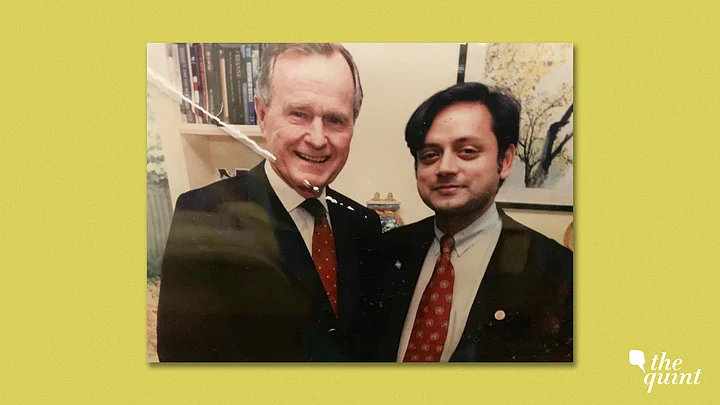George Herbert Walker Bush, the 41st President of the United States of America, who passed away last night at the age of 94, was the most internationalist of US Presidents – arguably the last one whose Presidency was driven more by considerations of global geopolitics than domestic politics.
India never quite warmed to George H.W. Bush. Partly this was because, with so many big-ticket global headline issues on his agenda, India never loomed large among his concerns. Partly, it may have been due to the fact that he lacked the charisma of his youthful successor, Bill Clinton, whose visit to New Delhi in 2000 is credited with constituting the first major breakthrough in Indo-US relations.
Friend of India and Several Indians
Despite being a kind, warm, friendly and unassuming gentleman – I was personally struck by him escorting me to the door of the bathroom of his home in Houston rather than just pointing out the way – he came across publicly as a rather patrician character, out of touch with the needs and wishes of the common people. This cost him his re-election, and its own way perhaps distanced him from Indian public opinion.
Too busy to read? Listen to this instead.
Yet, he was very much a friend of India. As a former ambassador to the UN, he knew and understood Indian policies and positions; as a knowledgeable internationalist, he was not inclined to see India through the lens of ignorance through which most American politicians regarded our country.
He had Indian friends as well, notably the tennis superstar Vijay Amritraj, a frequent sparring partner on the White House tennis courts (Bush was an obsessive and indefatigable tennis player) and the Florida dentist Zach Zachariah, who was Bush’s principal fund-raiser in the Indian-American community.
These friends took advantage of their proximity to the US President to sensitize him to India’s interests and concerns, and found Bush receptive and sympathetic.
As a former US Ambassador to the People’s Republic of China, Bush was inclined to be somewhat sympathetic to China. But developments in that country were not conducive to warming relations; the Tianmen Square massacre even led Bush to impose sanctions on the People’s Republic. Under Bush, therefore, India did not suffer from the Sinocentrism that has often limited Washington’s respect for Indian interests.
Handling Collapses & Unifications
Bush became President as the Cold war was ending; the dramatic collapse of the USSR, and the emergence of sixteen independent nations out of the ruins of the Soviet Union, occurred on his watch.
He worked to minimise the prospects of global disruption from this event and ensured that the Russian federation was accepted as the successor state to the USSR, including inheriting its permanent seat at the United Nations.
Bush also helped steward the world through the end of the Cold War and led his country’s successful negotiation of the Soviet withdrawal from Afghanistan.
The fall of the Berlin Wall opened the possibility of German reunification, which alarmed some European countries; Bush played a decisive supporting role in facilitating the emergence of the new united Germany, which has now established itself as the economic powerhouse of Europe and the anchor of the continent’s political stability.
Perhaps the most significant achievement of the Bush presidency was his masterly management of the consequences of Iraq’s invasion of Kuwait. He assembled an international coalition of countries including several Arab states, declared war on the Iraqi occupation and, through Operation Desert Storm, forced Iraq to withdraw humiliatingly from Kuwait. Though Bush was careful to order a halt to operations before the coalition troops could reach Baghdad, Saddam Hussein never recovered from this defeat. Saddam survived another decade before Bush’s son ordered the 2003 Iraq war that captured Baghdad and removed the Iraqi dictator.
Globalist Beyond Headlines
If these were the big headline events of his Presidency, the footnotes also featured international issues, from the U.S. military invasion of Panama he ordered, resulting in the arrest of that country’s ruler Gen Noriega, to the negotiation and signature of the North American Free Trade Agreement, which was ratified under his successor, Bill Clinton. Bush also ensured the US played a constructive role at the UN’s Environment Summit in Rio in 1992.
In his inaugural address in January 1989, Bush had laid the marker for his globalist Presidency by declaring: “I come before you and assume thePresidency at a moment rich with promise. We live in a peaceful, prosperous time, but we can make it better. For a new breeze is blowing, and a world refreshed by freedom seems reborn; for in man's heart, if not in fact, the day of the dictator is over. The totalitarian era is passing, its old ideas blown away like leaves from an ancient, lifeless tree. A new breeze is blowing, and a nation refreshed by freedom stands ready to push on.” These words, and the spirit behind them, infused his term of office and marks his legacy. Historians have already begun to regard him as an under-appreciated President. Indians may feel they have little to remember of George Herbert Walker Bush, but we live today in a world marked by his legacy.
(Former UN under-secretary-general, Shashi Tharoor is a Congress MP and an author. He can be reached @ShashiTharoor. This is an opinion piece and the views expressed above are the author’s own. The Quint neither endorses nor is responsible for the same.)
(At The Quint, we question everything. Play an active role in shaping our journalism by becoming a member today.)
